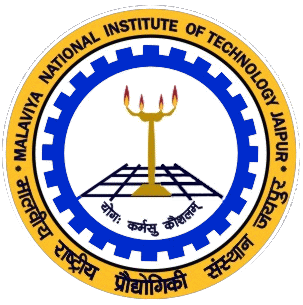
Fatima Mata National College is a college in the Indian state of Kerala, named after Our Lady of Fatima, a Catholic title of Virgin Mary. The college was ranked 92nd in India by the National Institutional Ranking Framework in 2022.

Miranda House is a constituent college for women at the University of Delhi in India. Established in 1948, it is one of the top ranked colleges of the country and ranked number 1 for consecutively seven years.

Malaviya National Institute of Technology Jaipur is a public technical university established by an act of Parliament of India and is located in Jaipur, India with an emphasis on engineering whereas programmes in science and management are also offered.

St. Berchmans College, most commonly known as SB College, is one of the first autonomous colleges, situated in Changanasserry, 17 km from Kottayam, in Kerala, India. Established in 1922, the college is considered to be one of the oldest and premier institutions of higher education in India. The University Grants Commission (UGC) identified the college under its “College with Potential for Excellence” scheme. UGC and the Government of Kerala granted autonomy to the college on 13 June 2014. The college celebrated its centenary in the academic year of 2022.

The University of Kelaniya is a public university in Sri Lanka. Just outside the municipal limits of Colombo, in the city of Kelaniya, the university has two major institutions and seven faculties.
Sri Venkateswara College is a constituent college of the University of Delhi established in 1961 in New Delhi, India. It is managed by Tirumala Tirupati Devasthanams & UGC and awards degrees under the purview of the University of Delhi. The college offers courses both at the undergraduate level and the postgraduate level. Vocational courses and short-term add-on courses that serve as significant supplement to the academic profiles of the students are offered by the college. Admissions are done purely based on merit and as per the Delhi University norms. It is ranked 14th among colleges in India by NIRF, 2022. Subsequently, in 2024 Outlook has ranked it: 6th in the Humanities stream, 9th in the Science stream and 13th in Commerce stream.

National Council of Educational Research and Training (NCERT) is an autonomous organisation of Ministry of Education, the Government of India. Established in 1961, it is a literary, scientific and charitable Society under the Societies Registration Act. Its headquarters are located at Sri Aurbindo Marg in New Delhi. Dr. Dinesh Prasad Saklani is the director of NCERT since 2022.

Buxi Jagabandhu Bidyadhar Autonomous College, better known as BJB Autonomous College, is a college in Bhubaneswar in Odisha, India that offers courses at primarily the higher secondary and undergraduate levels.

Samrat Ashok Technological Institute (SATI) is a Grant-in-Aid Autonomous college in Vidisha in the central Indian state of Madhya Pradesh. It was established by Late Maharaja Jiwajirao Scindia on November 1, 1960, with a donation from Gangajali Trust fund. It is an autonomous institute, which is funded by Government of Madhya Pradesh and managed by the Maharaja Jiwaji Rao Education Society chaired by Hon'ble Shrimant Jyotiraditya Madhavrao Scindia.
The institute started with degree courses in Civil Engineering, Mechanical Engineering & Electrical Engineering. The institute now offers nine full-time and six Part-time undergraduate courses leading to the degree in Bachelor of Engineering (B.E.) and sixteen Postgraduate courses in the areas of Engineering, Science and Management. The college campus is spread over an area of 85 acres.

The Demonstration Multipurpose School (DMS) of Bhubaneswar, Odisha, India, can trace its roots back to 1964, and is one of the oldest schools in Bhubaneswar. It is a co-educational school, administered by the NCERT. It serves about 1500 pupils, it is a constituents body of RIE. There are only four such schools in India located at Bhopal, Ajmer, Mysuru and Bhubaneswar.

Institute of Chemical Technology (ICT) is a public deemed university in Mumbai, India. It is focused on training and research in the fields of chemical engineering, chemical technology, and pharmaceutical sciences. Established in 1933, the institute was granted deemed university status in 2008, making it the only state-funded deemed university in India. In 2018, ICT was named an institute with a special status per the Empowered Expert Committee and was given the status of Category 1 institute with graded autonomy by the Ministry of Human Resource Development and the University Grants Commission (India). The institute also has regional campuses at Bhubaneswar, Odisha and Jalna, Maharashtra.

Kurseong College is a co-educational institute of higher learning and the oldest college in Kurseong, Darjeeling. It offers undergraduate courses in arts, commerce and science and is affiliated to the University of North Bengal.
The Regional Institute of Education, is a constituent unit of the National Council of Educational Research and Training (NCERT), New Delhi. The RIEs are set up in 1963 by Government of India in different parts covering various regions. The Regional Institutes were started with the objective of qualitative improvement of school education through innovative pre-service and in-service teacher education programmes and relevant research, development and extension activities. The Regional Institutes of Education have established themselves as institutes of repute in the area of school and teacher education. The institutes have endeavored to shoulder the responsibilities and challenges generated by changes in the educational scenario of the country.
Jawahar Navodaya Vidyalaya, West Champaran is a co-educational government residential school in Vrindavan village in West Champaran district in the Indian state of Bihar. It was established in 1986 by Navodaya Vidyalaya Samiti, a registered Society under Registration of Societies Act, 1860 and an autonomous body under the Department of School Education & Literacy, Ministry of Human Resource Development, Govt. of India. It is a C.B.S.E affiliated school primarily aims at identification and development of talented school children predominantly from rural areas who are denied good educational opportunities. The school provides reservation as per mandate of Govt. of India, at least 75% selection of students from rural areas, maximum 25% from urban areas and fixed 33% to girl students. The admission process goes through a district level entrance test called Jawahar Navodaya Vidyalaya Selection Test (JNVST) to select 80 students out of total class V passed appearing students. The school provides lateral admission to very limited seats of students of class IX and class XI in class X and XII respectively. It provides boarding, lodging, and medical to students at nominal fee of ₹200 per month. The students belonging to SC, ST, and disabled categories including girl students and students below the poverty line are provided exemption from the fee.
Rashtriya Madhyamik Shiksha Abhiyan (RMSA) is a centrally sponsored scheme of the Ministry of Human Resource Development, Government of India, for the development of secondary education in public schools throughout India. It was launched in March 2009. The implementation of the scheme has started from 2009–2010 to provide conditions for an efficient growth, development and equity for all. The scheme includes a multidimensional research, technical consulting, various implementations and funding support. The principal objectives are to enhance quality of secondary education and increase the total enrollment rate from 52% to 75% in five years, i.e. from 2009 to 2014. It aims to provide universal education for all children between 15 and 16 years of age. The funding from the central ministry is provided through state governments, which establish separate implementing agencies. The total budget allocated during the XI Five Year Plan (2002-2007) was ₹2,012 billion (US$24 billion).

Rayagada Autonomous College, Rayagada is a nongovernment aided college which is affiliated to the Berhampur University and Council of Higher Secondary Education, Odisha, India under the UGC scheme. It is situated in the town of Rayagada; the district headquarters of Rayagada district.

The National Repository of Open Educational Resources (NROER). NROER is developed by CIET, NCERT. It was launched during the National Conference on ICT (Information and Communication Technology) for School Education. NROER was launched on 13 August 2013 in New Delhi in collaboration with the Department of School Education and Literacy, Ministry of Human Resource Development, Government of India. Metastudio, the platform hosting the repository is an initiative of Knowledge Labs, Homi Bhabha Centre for Science Education, Mumbai. NROER hosts large number educational resources in many subjects and in different Indian languages for Primary, Secondary and Senior Secondary classes. Resources are available in different formats like Video, Image, Audio, Document and Interactive. Apart from this all NCERT books are available in Flip book format. NROER is an collaborative platform, intend to reached the un-reached and institutions like SCERT, SIERT, SIE, Vigyan Prasar, CCERT, Gujarat Institute of Educational Technology (GIET), SIET and other stake holders have their share in the educational content.
Ahalya Chari was an Indian educationist and the first commissioner of the Kendriya Vidyalaya chain of schools, a system of education under the Ministry of Human Resource Development (MHRD) India. Her efforts are recognised towards the establishment of Kendriya Vidyalaya Sangathan, an autonomous body under the MHRD, attending to the educational needs of the children of transferable central government employees. The Government of India awarded her the fourth highest Indian civilian honour of the Padma Shri in 1983.

Regional Institute of Education, Mysore is an educational institution and South Indian regional resource center of NCERT. It was established on 1 August 1963. It was enacted to improve school education by providing training to young education enthusiasts before teaching service (pre-service) and also provide timely training to working teachers (in-service). RIE Mysore provides its educational services to south Indian states of Andhra Pradesh, Karnataka, Kerala, Tamil Nadu and Telangana and union territories of Pondicherry and Lakshadweep. In-service courses provided by RIE Mysore is affiliated to state university, University of Mysore and all the courses are recognized by National Council for Teacher Education (NCTE).


















